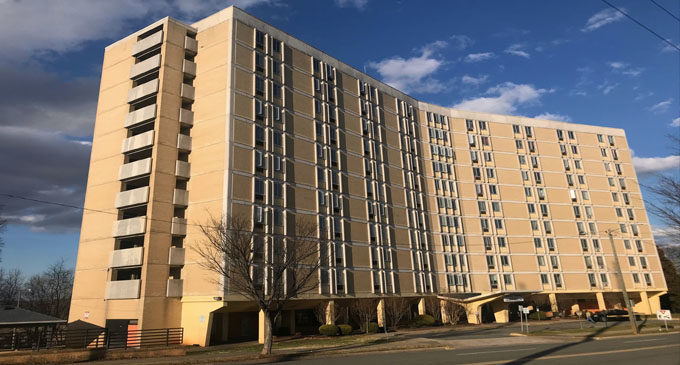Commentary: Housing Authority clarifies ‘Crystal Towers dilemma’

By Kevin Cheshire
The recently renewed public dialogue concerning the future of Crystal Towers reflects many of the same perspectives that have been shared among Housing Authority staff, commissioners, residents, advocates and elected officials over the past several years. Despite our collective tendency to oversimplify complex issues, there is more about which we agree than disagree concerning what the August 10 edition of the Winston-Salem Journal identified as “The Crystal Towers dilemma.”
Current Conditions
We all agree that Crystal Towers faces significant livability challenges and that its residents deserve better. The majority of the nation’s public housing stock was constructed in the middle of the 20th century and is long past its life expectancy. Likewise, funding to operate high-rise public housing is insufficient to cover operating costs, let alone depreciation. Nationally, there is a $70 billion backlog in public housing capital needs.
Current conditions at Crystal Towers reflect the aforementioned realities. They do not, however, reflect any failure to invest in, maintain, or repair the building in anticipation of a sale, as has been suggested. In the years following the public notice of a potential sale, the Housing Authority has spent nearly $2 million on capital repairs, improvements and maintenance at Crystal Towers. The budget for the upcoming fiscal year projects an investment of an additional $500,000. The Housing Authority has, and will continue to, operate Crystal Towers as it does all of its other properties, without regard to a potential sale.
Necessity of Relocation
We all also agree that relocation will be disruptive to residents – and that finding comparable alternative housing will be a lengthy and difficult process. But it is inaccurate to submit that it could all be avoided if only the building were to not be sold. Major building system replacements – water, sewer, electrical, mechanical, elevator – and millions of dollars in other needed renovations cannot be made while the building is occupied. Consequently, under either scenario (sale or repair), Crystal Towers’ residents will need to be relocated, period.
Threat of Homelessness
Below the Winston-Salem Journal’s “Crystal Towers dilemma” headline, a photograph poses the question, “Where Will We Go?” That is certainly a threshold question – indeed, the threshold question – that we all agree should be asked.
Under federal law, federally protected residents (which Crystal Towers’ residents are) must be provided comparable alternative housing – and they must be able to choose among various housing options. Whenever the relocation process begins, staff will be assigned to work with every Crystal Towers’ resident to identify resident-specific housing needs and to search for and obtain alternative housing that best meets those needs. Once alternative housing is identified, all moving costs will be covered ($200,000 has already been committed) and residents will continue to pay the same income-based rent they currently pay at Crystal Towers.
We predict that relocation of every resident will be able to be accomplished over an 18-month period, taking into account the turnover rate in other public housing communities and within the voucher (Section 8) program. The building will not be sold until every resident has been rehoused.
Resident Needs
Crystal Towers was designed for the elderly and physically disabled to live together symbiotically. While that model worked well for most of the 20th century, the population at Crystal Towers (though still restricted to elderly and disabled) has changed dramatically due to the influx of residents with non-physical disabilities. Many Crystal Towers’ residents face mental health challenges that render it nearly impossible for them to adhere to the behavioral and housekeeping standards required to maintain safe and sanitary housing. Without third-party support in place, a renovated Crystal Towers will quickly succumb to many of the same livability challenges it is currently facing.
Given capital needs and operating deficits, continuing to maintain Crystal Towers as a public housing community is not viable over the long term, as the building will continue to pull resources away from other housing programs. Consequently, we have to make a choice between acting now (when conditions and costs of relocation can be controlled) and acting later (when we may be forced into an emergency relocation). If we fail to act now, when the property is an attractive redevelopment target, we risk losing the opportunity to compassionately rehouse residents in alternative sustainable environments while simultaneously creating additional affordable housing opportunities using proceeds from the sale.
In waiting, hoping to find a perfect solution to an imperfect problem, we risk turning the Crystal Towers’ dilemma into the Crystal Towers’ disaster.
Kevin Cheshire is the executive director of the Winston-Salem Housing Authority.















